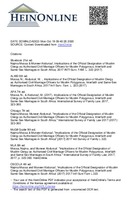| dc.contributor.author | Moosa, Najma | |
| dc.contributor.author | Abduroaf, Muneer | |
| dc.date.accessioned | 2020-10-19T13:53:48Z | |
| dc.date.available | 2020-10-19T13:53:48Z | |
| dc.date.issued | 2017 | |
| dc.identifier.citation | Moosa, N., & Abduroaf, M. (2017). Implications of the Official Designation of Muslim Clergy as Authorised Civil Marriage Officers for Muslim Polygynous, Interfaith and Same-Sex Marriages in South Africa. International Survey of Family Law, 2017, 323-360. | en_US |
| dc.identifier.uri | http://hdl.handle.net/10566/5282 | |
| dc.description.abstract | From 2014 to 2017 some 227 South African Muslim clergy, including three females, graduated as civil marriage officers in terms of the Marriage Act 25 of 1961. Although now vested with dual capacity to perform both Muslim marriages (nikahs) and officiate at civil marriages, their designation authorises them to solemnise and register only civil marriages. All religious marriages, including Muslim polygynous marriages, remain formally unrecognised in South Africa. The nikah is expected to precede the civil marriage ceremony; however, they remain two separate (unrelated) marriages. | en_US |
| dc.language.iso | en | en_US |
| dc.publisher | University of Western Cape | en_US |
| dc.subject | South Africa | en_US |
| dc.subject | Muslim clergy | en_US |
| dc.subject | Muslim polygynous marriages | en_US |
| dc.subject | Religion | en_US |
| dc.title | Implications of the official designation of Muslim clergy as authorized civil marriage officers for Muslims polygynous interfaith and same sex marriage in South Africa | en_US |
| dc.type | Article | en_US |

